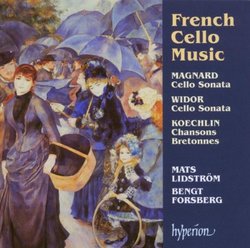| All Artists: Alberic Magnard, Charles Koechlin, Charles-Marie Widor, Bengt Forsberg Title: French Cello Music Members Wishing: 2 Total Copies: 0 Label: Hyperion UK Original Release Date: 1/1/2003 Re-Release Date: 8/12/2003 Album Type: Import Genre: Classical Styles: Opera & Classical Vocal, Chamber Music, Historical Periods, Classical (c.1770-1830), Instruments, Strings Number of Discs: 1 SwapaCD Credits: 1 UPC: 034571172446 |
Search - Alberic Magnard, Charles Koechlin, Charles-Marie Widor :: French Cello Music
 | Alberic Magnard, Charles Koechlin, Charles-Marie Widor French Cello Music Genre: Classical
|
Larger Image |
CD Details |
CD ReviewsExplore the Byways of French Chamber Music 05/05/2004 (5 out of 5 stars) "Mats Lidstrom takes us far off the beaten track in this recital featuring rarities by Magnard, Koechlin, and Widor. Of the three, probably the least familiar is Alberic Magnard, but he contributes the most substantial and memorable work to the recital. If you know Magnard's symphonies, especially Nos. 3 and 4, you'll hear the chamber-music equivalent in the Cello Sonata of 1911. As with the Fourth Symphony, a composition contemporary with the sonata, you'll find a steel spring of a scherzo and an almost equally propulsive rondo last movement that are somewhat offset by the more lyrical first movement and slow movement marked "Funebre." But in both of these movements there is an uncompromising toughness and lack of sentimentality that mark them as more early modern than late romantic.Charles Koechlin's Chanson Bretonnes are short fantasy pieces a la Schumann, many with a vague programmatic connection to Arthurian legend. They're mostly bright, charming, aphoristic works (in the case of "La Marche d'Arthur," a cello solo, puzzlingly aphoristic!) that will please lovers of the short character piece.The Cello Sonata of Charles Marie Widor--he of the famous Toccata from the Organ Symphony No. 5--tends to ramble a lot more than the economical Magnard Sonata, but it certainly has its moments of graceful utterance, and it ends in a blaze of romantic glory.Lidstrom and his partner Bengt Forsberg catch the many moods of this music fabulously well, from the quiet songfulness of the Koechlin to the furious bowing and keyboard-thumping required by Magnard in his scherzo. I can't imagine a more committed advocacy. The recording is close up and potent, which works best in the fiery Magnard. Some may prefer a bit more airiness, but the recording is very good of its kind."
|

 Track Listings (16) - Disc #1
Track Listings (16) - Disc #1